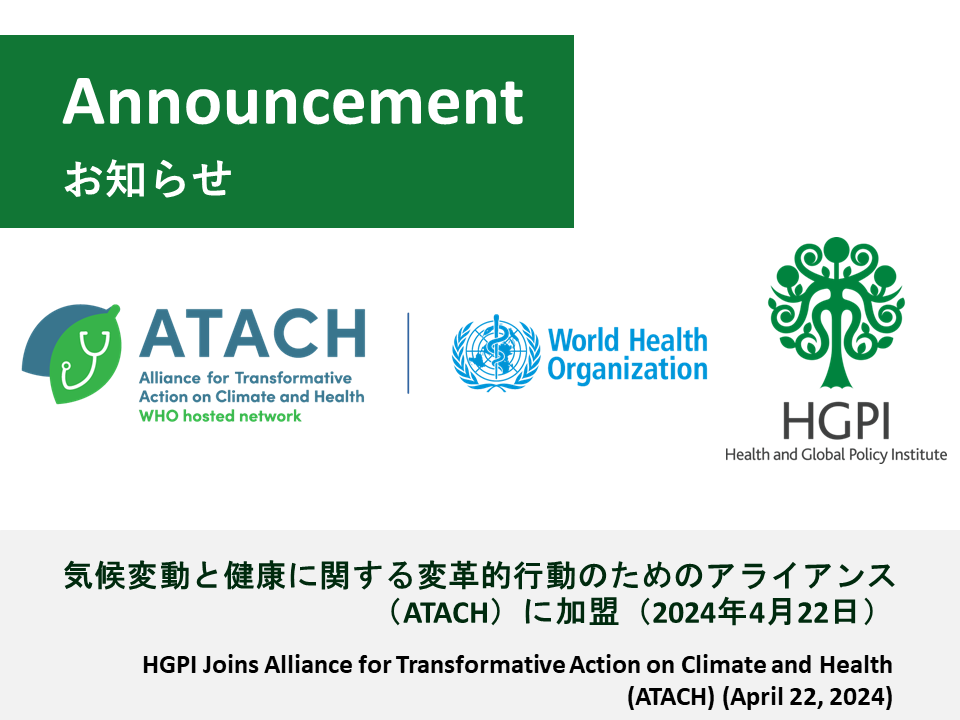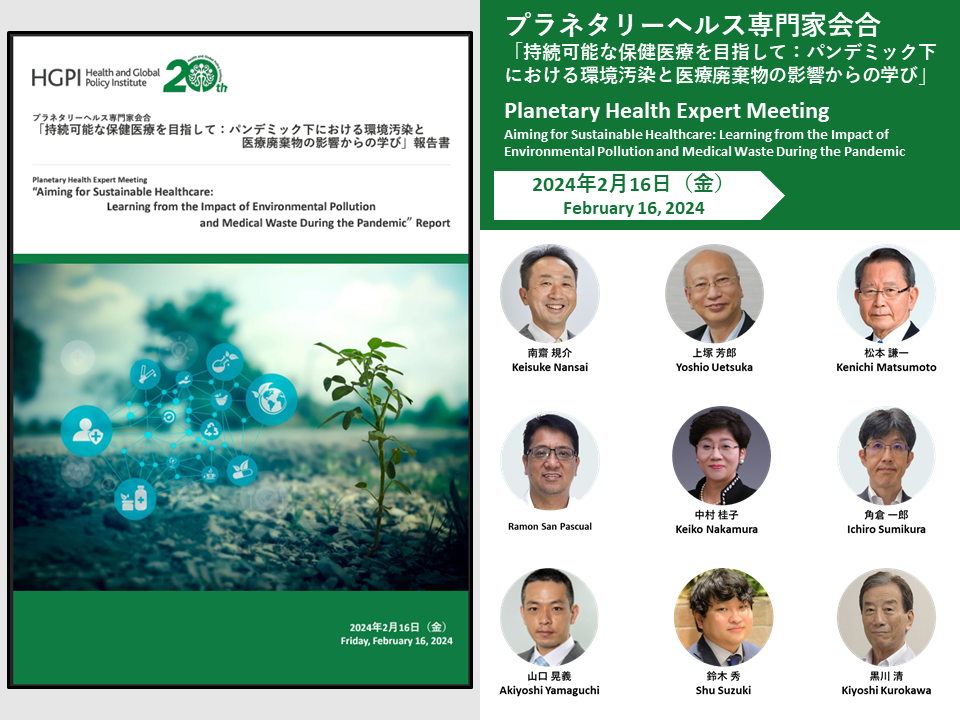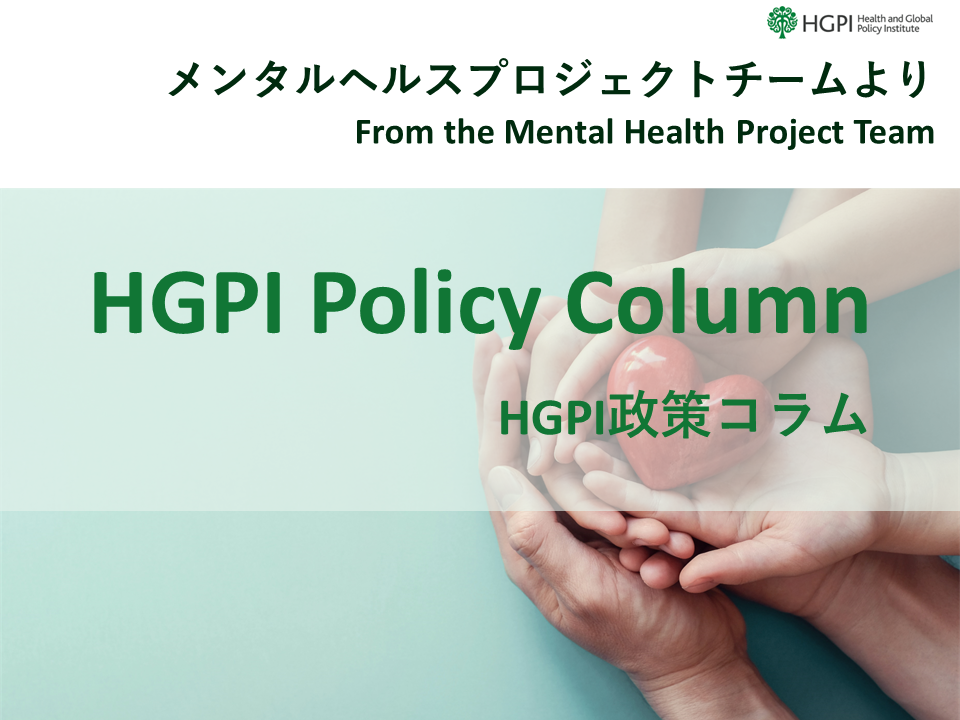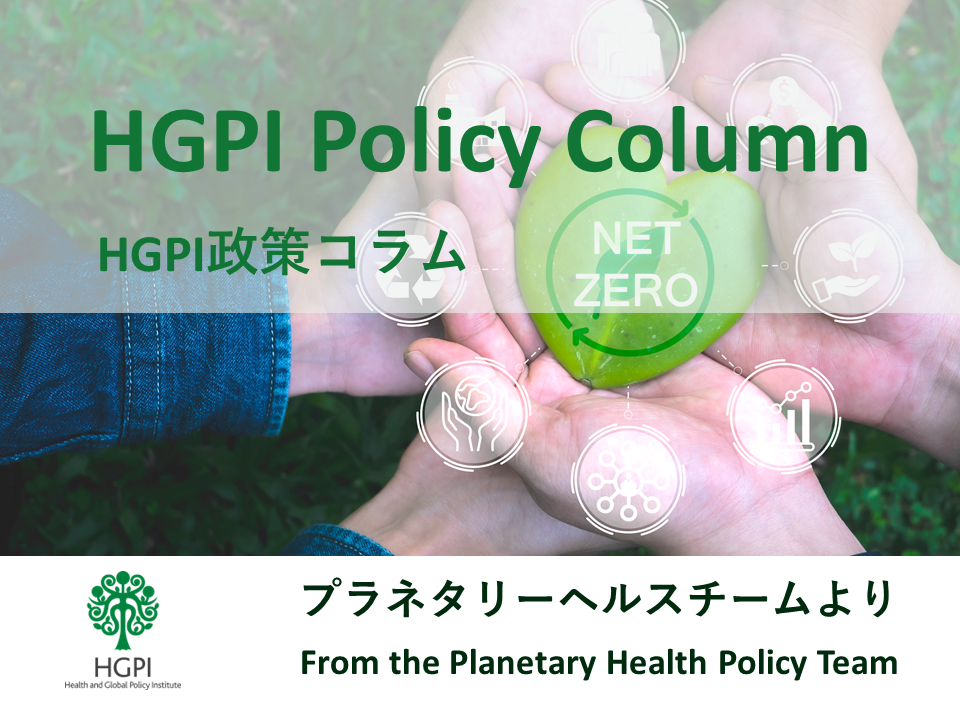[HGPI Policy Column] (No.43) — From the Planetary Health Project “Part 8: Global Framework for Achieving Sustainable Health Care Systems – ATACH and Initiatives by Countries”
date : 5/30/2024
![[HGPI Policy Column] (No.43) — From the Planetary Health Project “Part 8: Global Framework for Achieving Sustainable Health Care Systems – ATACH and Initiatives by Countries”](https://hgpi.org/en/wp-content/uploads/sites/2/508c6d87d86e987a0b970e2875bf529d-1.jpg)
<POINTS>
- On May 28, the Japanese government announced that Japan had just formally joined ATACH at the 77th World Health Assembly
- At COP26, the UK government and others promoted the establishment of climate resilient and sustainable health systems, and ATACH was organized as a global effort, with more than 80 countries committing
- ATACH supports countries that has pledged commitments with vulnerability & adaptation assessments (V&A) and the development of the Health National Adaptation Plans (HNAP)
- With Japan officially joining ATACH, the Japanese government is expected to further commit to setting a date for achieving net-zero emissions in the health care system and to act to achieve these commitments.
Introduction
In recent years, health risks due to climate change have been the focus of attention at the Conference of the Parties (COP) to the United Nations Framework Convention on Climate Change (UNFCCC). At COP28 in December 2023, the first Health Day was held in collaboration with the World Health Organization (WHO), the COP28 UAE Presidency, and the Wellcome Trust. During the Health Day, the “COP28 UAE Declaration on climate and health” was signed by 143 countries, including Japan.
Following the Health Day, the Health Pavilion also hosted “ATACH Day,” which stands for the Alliance for Transformative Action on Climate and Health, for which WHO serves as the secretariat. Given the increasing attention being paid to health in the climate change discourse, this column introduces the process leading to the establishment of ATACH, the commitments made by countries, and the progress being made.
COP26 Health Programme and ATACH
At COP26, 52 countries pledged their commitments to building climate resilient and sustainable health systems. These commitments were derived from the COP26 Health Programme, which was launched as an initiative between the UK COP26 Presidency, WHO, and other organizations and institutions.
This COP26 Health Programme calls on countries to make two main commitments to build “climate resilient health systems” and “sustainable low carbon health systems”. These commitments are made by countries to their own citizens [1] To support countries in making and implementing these ambitious commitments for climate resilience and decarbonization of the health sector, ATACH has been established to serve as a global platform for collective action with a rich diversity of local experiences in building climate resilient and low carbon sustainable health systems. The ATACH community consists of partners such as countries that have made commitments and some of their ministries of health, as well as NGOs. It also welcomes the participation of countries and regions that have not yet made commitments.
About COP26 Health Commitments
The COP26 Health Commitments have two specific areas: “Climate Resilient Health Systems” and “Sustainable Low Carbon Health Systems”.
Commitment Area 1: Climate Resilient Health Systems
- Commit to conduct climate change and health vulnerability and adaptation assessments (V&As) at population level and/or health care facility level by a stated target date.
- Commit to develop a health national adaptation plan informed by the health V&A, which forms part of the National Adaptation Plan to be published by a stated target date.
- Commit to use the V&A and HNAP to facilitate access to climate change funding for health (e.g., project proposals submitted to the Global Environmental Facility, Green Climate Fund, Adaptation Fund, or GCF Readiness programme).
Commitment Area 2: Sustainable Low Carbon Health Systems
- High ambition/high emitters: Commit to set a target date by which to achieve health system net zero emissions (ideally by 2050).
- All countries: Commitment to deliver a baseline assessment of greenhouse gas emissions of the health system (including supply chains)
- All countries: Commit to develop an action plan or roadmap by a set date to develop a sustainable low carbon health system (including supply chains) which also considers human exposure to air pollution and the role the health sector can play in reducing exposure to air pollution through its activities and its actions.
Commitment Status of Each Country
In October 2020, the UK’s National Health Service (NHS) became the first national health system in the world to set a goal to achieve net-zero carbon emissions in its health system. The NHS aims to achieve net-zero carbon emissions directly related to health services by 2040, and net-zero carbon emissions across its entire supply chain by 2045.
The commitment status of the other countries varies. when the Health Program was initiated at COP26, 50 countries had made commitments [2], but as of May 2024, this number has increased to 82 countries. Of the 82 countries, 81 countries have pledged to Commitment Area 1 and 75 countries have pledged to Commitment Area 2. Out of 75 countries that have pledged to Commitment Area 2, 38 countries have additionally pledged an ambitious commitment to set a target date for achieving a net zero health system [3].
As part of its monitoring, ATACH has also established baselines to track progress in implementing the COP26 Health commitments, and information on relevant activities completed since 2020, collected from member countries and partners, is available on the ATACH website. The five baselines established are as follows;
- Vulnerability & Adaptation (V&A) assessment conducted since 2020;
- Health National Adaptation Plan (HNAP) developed or updated since 2020;
- Climate financing received, covering 2020 or later;
- GHG Emissions Assessment conducted for the health system since 2020;
- Low-carbon and Sustainable Health Systems (LCSHS) Action Plan/Road Map developed since 2020.
It has been three years since the COP26 Health Program was first proposed at COP26, and V&A and HNAP development or updates have been completed or initiated in half of the countries that have made commitments (Figure 1). In addition, several partners, mainly those who are members of ATACH, are supporting V&A and HNAP development and updates in their respective countries to meet their country commitments. Additionally, G7 countries other than Japan and Italy, which made commitments at an early stage, are steadily taking action to meet their commitments (Figure 2).
Figure 1: Status of implementation of commitments in countries that have made Health commitments
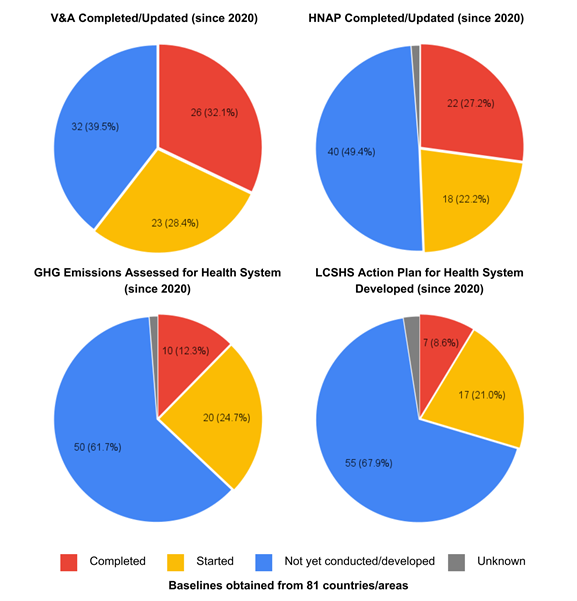
Source: World Health Organization. ATACH baselines by country/area 2023-2024. [dataset]. World Health Organization: Geneva. 2024. Available from: https://www.atachcommunity.com/our-impact/commitment-tracker/atach-baselines
Figure 2: Status of implementation of commitments in G7 countries that have made Health commitments early on
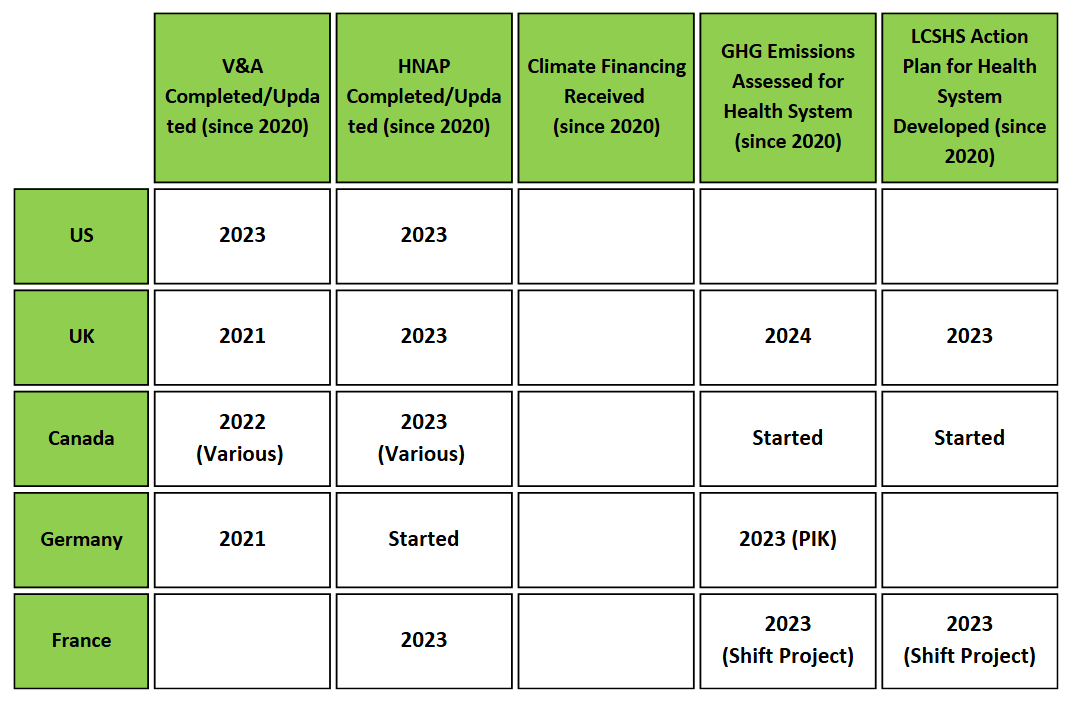
Source: World Health Organization. ATACH baselines by country/area 2023-2024. [dataset]. World Health Organization: Geneva. 2024. Available from: https://www.atachcommunity.com/our-impact/commitment-tracker/atach-baselines
* Year indicates year of completion; partner support for completion and development of commitments is shown in parentheses.
**PIK: (Potsdam Institute for Climate Impact Research)
Japanese Government’s ATACH Initiatives
On May 28, at the 77th World Health Assembly, the Japanese government announced that Japan had just formally joined ATACH. The Japanese government has committed to building “climate-resilient health systems” in Area 1 and “sustainable low-carbon health systems” in Area 2, but has not yet committed to setting a “target date for achieving net zero emissions for health systems,” which is recommended for high emitters. In addition to joining ATACH, the COP28 UAE Climate and Health Declaration, signed by Japan at COP28, also mentions efforts related to ATACH. The declaration calls for “strengthening trans- and inter-disciplinary research, cross-sectoral collaboration, sharing of best practices, and monitoring of progress at the climate-health nexus” through initiatives such as ATACH. With the Japanese government’s recent attention to the relationship between health and climate change by signing the Declaration and formally joining ATACH, further commitment to set a date for achieving net-zero emissions in the health care system and the fulfillment of these commitments, as well as Japan’s global role in this matter, are anticipated.
In March 2024, the Health and Global Policy Institute (HGPI) joined ATACH as Japan’s first official partner. We are committed to fulfilling our role as a partner and strengthening our efforts to achieve the goals of ATACH.
This column has introduced the process of establishing ATACH, the commitments made by countries, and the progress made. The next column will introduce the role and structure of ATACH, as well as the commitments of the ATACH partners and the Working Group.
Works referenced
[1] World Health Organization. COP26 Health Programme: Country commitments to build climate resilient and sustainable health systems. World Health Organization: Geneva. 2021. Available from: https://cdn.who.int/media/docs/default-source/climate-change/cop26-health-programme.pdf.
[2] World Health Organization. Countries commit to develop climate-smart health care at COP26 UN climate conference. World Health Organization: Geneva. 2021. Available from: https://www.who.int/news/item/09-11-2021-countries-commit-to-develop-climate-smart-health-care-at-cop26-un-climate-conference.
[3] World Health Organization. Commitments. World Health Organization: Geneva. n.d. Available from: https://www.who.int/initiatives/alliance-for-transformative-action-on-climate-and-health/commitments.
Authors
Eri Cahill (Program Specialist, Health and Global Policy Institute)
Kenta Minamitani (Program Specialist, Health and Global Policy Institute / Senior Associate, Mori Hamada & Matsumoto)
Akira Shimabukuro (Adjunct Fellow, Health and Global Policy Institute)
Shu Suzuki (Senior Associate, Health and Global Policy Institute)
Joji Sugawara (Vice President, Health and Global Policy Institute)
Top Research & Recommendations Posts
- [Policy Recommendations] The Path to a Sustainable Healthcare System: Three Key Objectives for Public Deliberation (January 22, 2026)
- [Research Report] The 2025 Public Opinion Survey on Healthcare in Japan (March 17, 2025)
- [Research Report] Perceptions, Knowledge, Actions and Perspectives of Healthcare Organizations in Japan in Relation to Climate Change and Health: A Cross-Sectional Study (November 13, 2025)
- [Policy Recommendations] Reshaping Japan’s Immunization Policy for Life Course Coverage and Vaccine Equity: Challenges and Prospects for an Era of Prevention and Health Promotion (April 25, 2025)
- [Research Report] The 2023 Public Opinion Survey on Satisfaction in Healthcare in Japan and Healthcare Applications of Generative AI (January 11, 2024)
- [Research Report] AMR Policy Update #4: Cancer Care and AMR (Part 1)
- [Public Comment Submission] “Assessment Report on Climate Change Impacts in Japan (Draft Overview)” (December 24, 2025)
- [Policy Recommendations] Developing a National Health and Climate Strategy for Japan (June 26, 2024)
- [Research Report] The Public Opinion Survey on Child-Rearing in Modern Japan (Final Report) (March 4, 2022)
- [Research Report] Survey of Japanese Physicians Regarding Climate Change and Health (December 3, 2023)
Featured Posts
-
2026-01-09
[Registration Open] (Hybrid Format) Dementia Project FY2025 Initiative Concluding Symposium “The Future of Dementia Policy Surrounding Families and Others Who Care for People with Dementia” (March 9, 2026)
![[Registration Open] (Hybrid Format) Dementia Project FY2025 Initiative Concluding Symposium “The Future of Dementia Policy Surrounding Families and Others Who Care for People with Dementia” (March 9, 2026)](https://hgpi.org/en/wp-content/uploads/sites/2/dementia-20260309-top.png)
-
2026-02-05
[Registration Open] (Webinar) The 141st HGPI Seminar “Current Status and Future Prospects of Korea’s Obesity Policy: Voices of People with Lived Experience in Policy Promotion” (March 3, 2026)
![[Registration Open] (Webinar) The 141st HGPI Seminar “Current Status and Future Prospects of Korea’s Obesity Policy: Voices of People with Lived Experience in Policy Promotion” (March 3, 2026)](https://hgpi.org/en/wp-content/uploads/sites/2/hs141-top-1.png)
-
2026-02-06
[Research Report] AMR Policy Update #5: Cancer Care and AMR (Part 2)
![[Research Report] AMR Policy Update #5: Cancer Care and AMR (Part 2)](https://hgpi.org/en/wp-content/uploads/sites/2/HGPI_20260204_AMR-Policy-Update-5.png)




